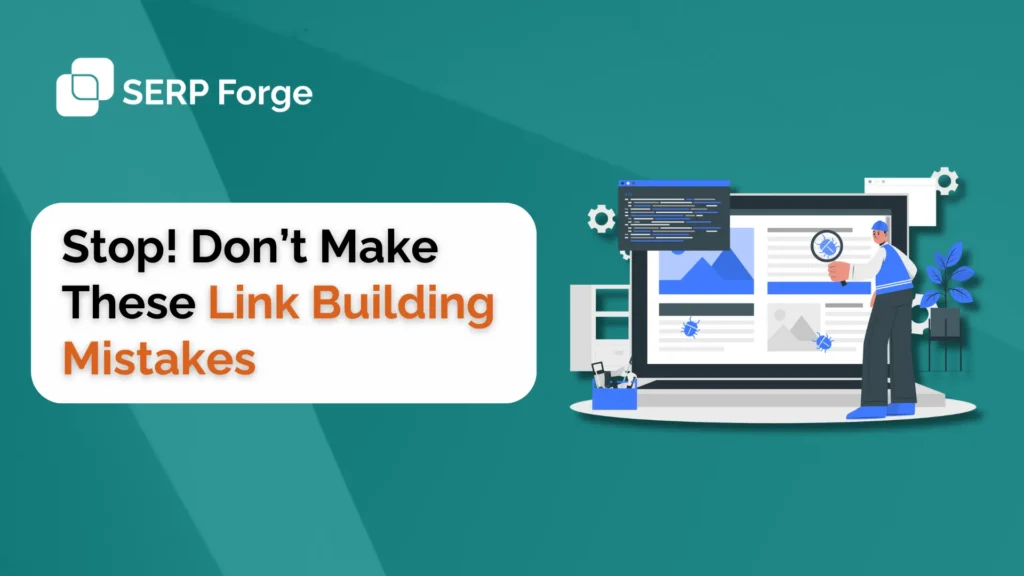As a website owner or SEO professional, you already know how important link building is to your SEO strategy. It’s as important as fuel is for running your car. Without it, your car is not going anywhere.
In other words, without a proper link building strategy in place, your website is not moving much up, not in search engine rankings, nor in authority.
Link building is important, true. But link building mistakes are more common than you think.
Why?
The two most common reasons for that are lack of proper knowledge, and wanting to game or manipulate the algorithm. You don’t want to do either. What you want is a clean white hat link building strategy deployed.
But why is that?
Isn’t building more links more important than doing it the right way? After all, the more fuel, the more your car will run. The answer is no. While that might be true for cars, it’s not the same for link building.
If you want long-term results (who doesn’t?) and do not want Google to take punitive actions toward your site, you better stick to the guidelines. Google’s algorithm is smart at detecting unethical practices to get ranks and is pretty strict there. More often than not it penalizes a site for doing that. You don’t want that to happen to you.
But we understand that sometimes mistakes might happen without wanting them to.
That’s why this list.
This comprehensive list will help you avoid common link building mistakes that might negatively impact your website. As such, you’ll also be able to maintain a healthy backlink profile for yourself.
- 1. Buying links
- 2. Using Private Blog Networks (PBNs)
- 3. Over-optimizing anchor text
- 4. Not optimizing anchor text at all
- 5. Building only dofollow links
- 6. Not taking any action to remove toxic links
- 7. Getting links from websites that are not indexed by Google
- 8. Building links that are irrelevant to your content
- 9. Submitting links to low-quality directories
- 10. Over-prioritizing link quantity over quality
- 11. Not diversifying your link profile or tactics
- 12. Relying too much on DR or DA metrics
- 13. Neglecting internal linking structures
- 14. Building links too quickly (unnatural link velocity)
- 15. Creating links from websites in a different language
- 16. Spamming links in forums or blog comments
- 17. Excessive reciprocal linking
- 18. Not creating link-worthy content
- 19. Not leveraging unlinked brand mentions
- 20. Ignoring the importance of social media signals
- 21. Guest Posting on irrelevant websites
- 22. Building links to low-quality content
- 23. Using automated link building tools
- 24. Building site-wide or footer section links
- 25. Using generic or non-personalized outreach emails
- 26. Not measuring link building results
- 27. Neglecting geo-targeted link building for local SEO
- 28. Not focusing on links from pages with social shares
- 29. Article spinning for link creation
- 30. Chasing the “perfect” link instead of consistency
- 31. Not leveraging relationships for backlinks
- 32. Ignoring on-page SEO alongside link building efforts
- 33. Building links in a negative or controversial context
- Conclusion
- FAQs
1. Buying links
Do not buy links. Meaning, do not pay another site to place your website link on theirs. Because this practice goes against Google’s Webmaster Guidelines. And, you might get penalized, rank removed, or worse, your site might get removed from search results.
Google’s John Mueller answers whether to spend money on artificial link building:
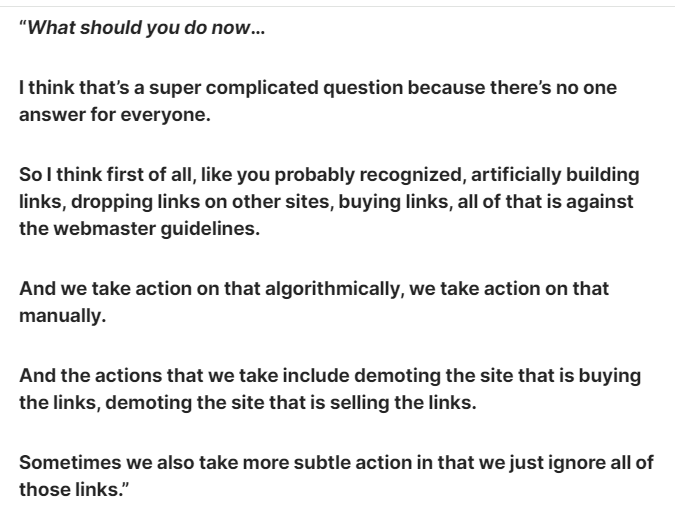
Source: Search Engine Journal
So, you don’t want to violate the guidelines. Always keep a safe distance from low-cost offers for links because they might land you on potentially harmful sites.
2. Using Private Blog Networks (PBNs)
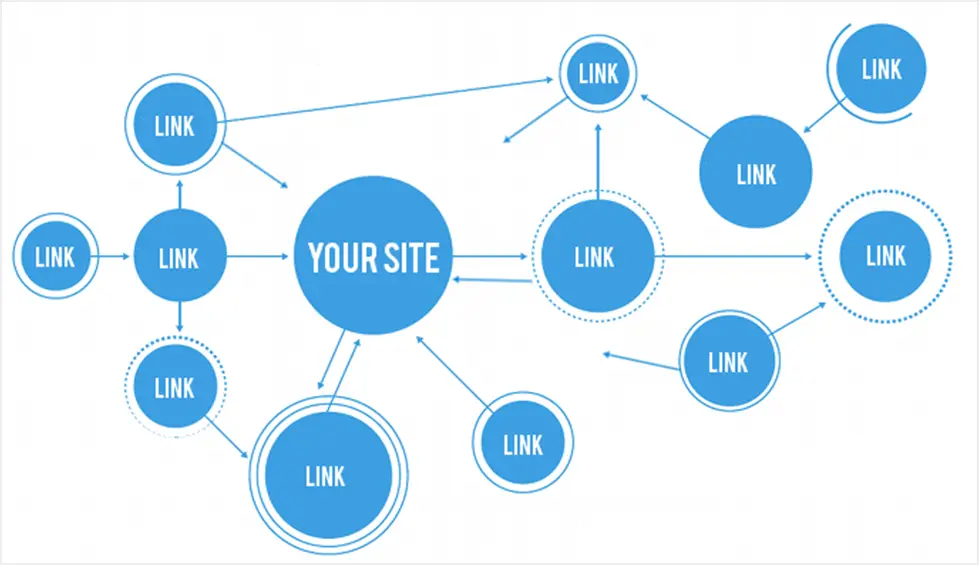
PBN stands for Private Blog Network. Here a group of websites are owned and controlled by a single entity with the primary goal of building backlinks to a target website.
This practice artificially increases the number of high-quality backlinks pointing to the target site, thus manipulating the search engine rankings.
As it is a way of manipulating the search engine, it is against its webmaster guidelines. So, it’s extremely risky to use this black hat technique.
Google and its regularly updated algorithms are actively working to identify and eliminate the use of PBNs from SEO.
It’s just a matter of time before PBN becomes a history. For now, if Google finds out that you are using PBNs to manipulate its algorithm, it may penalize you severely.
Your site may be completely removed from rankings or you may have to suffer a major loss in rankings, neither of which you want to happen.
3. Over-optimizing anchor text
Optimizing anchor text in link building is done to stay relevant to the search engine and readers. However, the urge to pack keywords in it or the lack of variety can lead to penalties from search engines. The text might look spammy or forced.
Take a look at the example below:
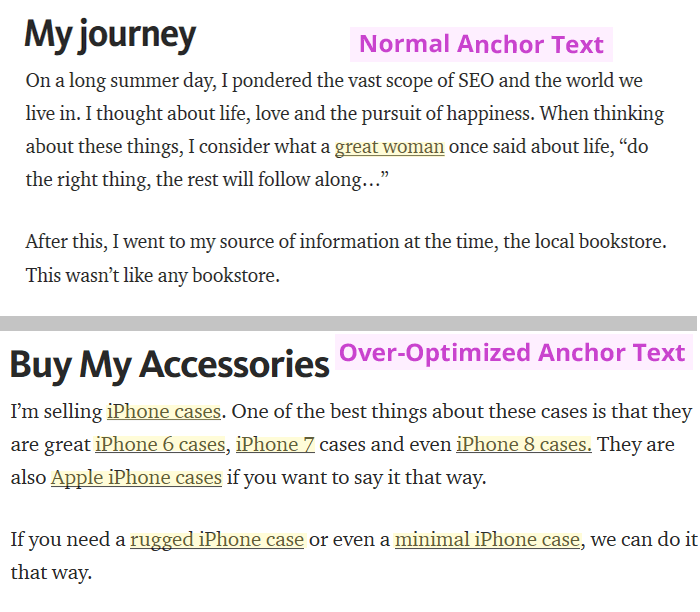
Source: Elite Strategies
Doesn’t the lower one sound unnatural? Of course, it does. Google and other search engine filters too find these types of keyword stuffing into anchor text unnatural and spammy, indicating manipulative SEO practices.
So, the optimal practice is to create an anchor text that sounds natural and reflects the content of your page accurately.
4. Not optimizing anchor text at all
Not optimizing your anchor text is another link building mistake that sloppy marketers frequently make. It’s a legit practice to make the clickable text of your content sound relevant and correct. Optimizing is essential for successful link building. Overlooking it can give inadequate results.
Take a look below for example:
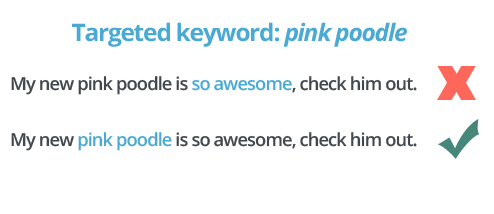
Source: Elite Strategies
The correct way to optimize your anchor text is the second one. The first instance is irrelevant. Meaning, search engines and readers alike will click on the first link to probably see something related to the term ‘so awesome’ while the targeted page will be on a pink poodle. And, you don’t want to confuse the search engine or readers, which is bad for SEO.
5. Building only dofollow links
The links that Google bots follow are called dofollow. Whereas, the links that you do not want the bots to follow are termed nofollow.
Nofollow links do not contribute to rankings as Google bots do not transfer Page Rank to the destination page while crawling these links.
This may give the impression that nofollow links are next to nothing. However, in reality, many websites place a nofollow attribute on their external links. So, if all your backlinks are dofollow it is suspicious. The same is the case when all your backlinks are nofollow.
6. Not taking any action to remove toxic links
Toxic links refer to backlinks that harm a website’s search engine rankings rather than improve them. These links are often associated with spammy, manipulative, or low-quality practices and can trigger penalties from search engines like Google.
So, monitor your backlink profile regularly and look for links from link farms, spammy websites, banned or penalized sites, or broken links that may lead to penalties from Google and cause harm to your SEO efforts. Once you spot any problematic links, you should take steps to have them removed.
For that, you can connect with the website owner on whose site the said link is. If the owner is unresponsive, you can use the Google Disavow tool to submit those links. It’s like saying to Google ‘I don’t want these links to be a part of my link profile.’
Nowadays, Google itself is capable of ignoring such links. However, it’s always better to take action when you can than regret it later.
Ignoring bad or toxic links can negatively affect your SEO. Thus, take the necessary action against bad links and you’ll solve this issue.
7. Getting links from websites that are not indexed by Google
Google determines the authority of your website by the links you acquire over time. While doing that, it only considers links from indexed websites. If you have a link from a website that is not indexed by Google, it will not count in improving your ranking.
What’s more, it can even be considered to be a low-quality or spammy link to your website, ultimately harming your reputation.
So, when building links seek to earn them only from high-authority, indexed sites.
To check if a site is indexed or not, you can use the site: operator.
Just go to Google and type site:yourwebsite.com in the URL bar. Replace yourwebsite.com with the website address that you want to check.
If the site is indexed, Google will return a list of pages from that site. If it’s not, you’ll see a message like ‘Your search didn’t find any documents.’
8. Building links that are irrelevant to your content
Links from irrelevant websites, ultimately harm your SEO strategy and should be avoided. For example, if you are running a shoe business, links from adult sites or link farms can harm your SEO.
Also, links from hacked sites are considered illegal and may cause penalties.
So, make sure the websites from which you get your links are topically relevant to your business.
To find relevant websites, start by determining your niche and primary keywords. For example, if your niche is fitness, you could try searching for keywords like ‘health blogs,’ ‘fitness tips,’ ‘gym reviews.’
This will help you find sites that are contextually aligned with your content.
9. Submitting links to low-quality directories
We do not recommend directory submission at all. It’s an old and outdated technique. But still, some marketers make use of this technique for backlinking.
While directory submission is not an issue in itself, (other than being valueless), the problem occurs when you submit your link to too many low-quality directories.
These days search engine algorithms are advanced enough to detect and penalize such practices.
Instead, focus on submitting your website link to a few high-quality, niche-specific directories.
10. Over-prioritizing link quantity over quality
Quality, quality, quality. That is what link building is all about. Not following this simple yet powerful guideline is a major mistake in link building.
One link from a high-authority website holds more weight for search engines than hundreds of low-quality links.
Google’s John Mueller talks about link quantity vs. link quality:
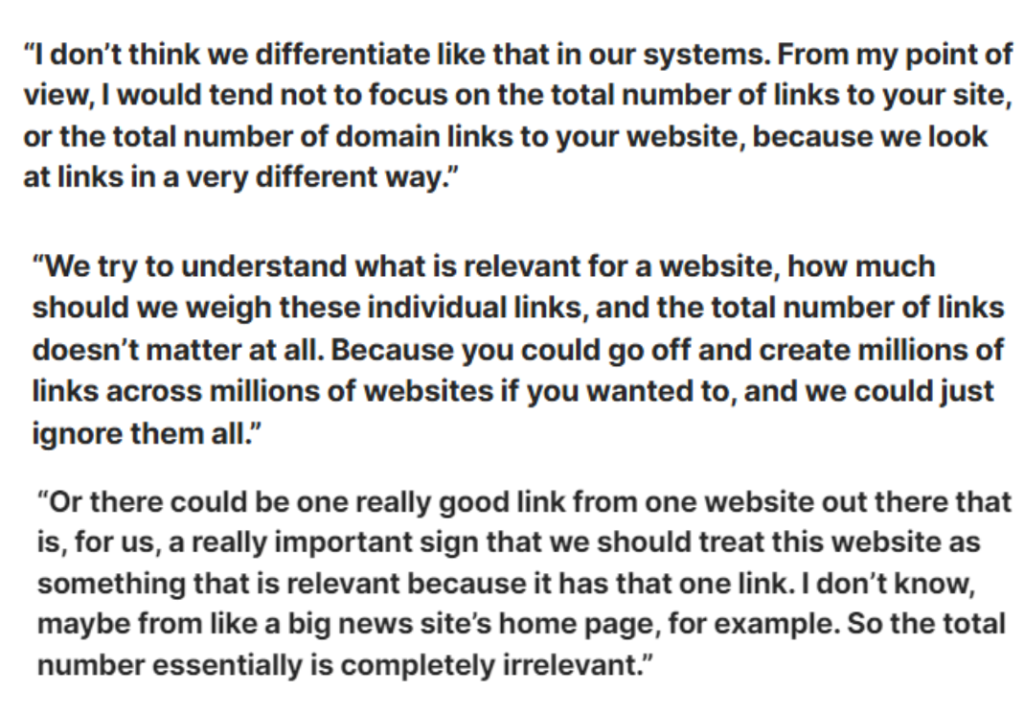
Source: Search Engine Journal
Ignoring link quality and focusing only on quantity is a strategic link building mistake many make. The lack of proper knowledge plays a factor in such practices. Or, some SEO professionals may do this to fool their clients.
Either way, this is a big link building mistake and this practice should be avoided at all costs.
If you want to build quality links and increase your SEO metrics like Organic search volume, DR, and others, you can reach out to us.
11. Not diversifying your link profile or tactics
A strong backlink profile consists of diverse links from multiple sources and types.
Depending on a single source for your links can prove to be harmful to your SEO. Your competitors are probably maintaining a healthy link profile from various sources and so should you.
Search engines mark links from various sources as legitimate. So, always take care to diversify your link profile and get links using guest blogging, Skyscraper, Guestographics, and social media for better SEO results.
Also, use different tactics to build high-quality links. For example, do not create links solely on your homepage. Make sure you create links to other service pages including blog pages and other money pages.
12. Relying too much on DR or DA metrics
When building a backlink, it’s normal to check the site’s authority and relevance. While checking relevance is easy and has to be done manually, to check authority, we usually rely on third-party metrics like Domain Rating (DR) or Domain Authority (DA).
However, you must not rely completely or blindly on these metrics either. Being third-party metrics, they can be easily messed up with. You’ll see hundreds of offers on various platforms claiming to raise your DA or DR. And, guess what? It can really be done.
So, relying too heavily on these metrics means maybe you are losing out on high-quality links from websites with not-so-high DR or DA.
Instead, check other metrics like organic traffic or which keywords the site is ranking for. In other words, check metrics that are not easy to fake.
Note: Check out this Reddit forum discussion to get a better understanding of DA and DR, and why we should not rely on these metrics too much.
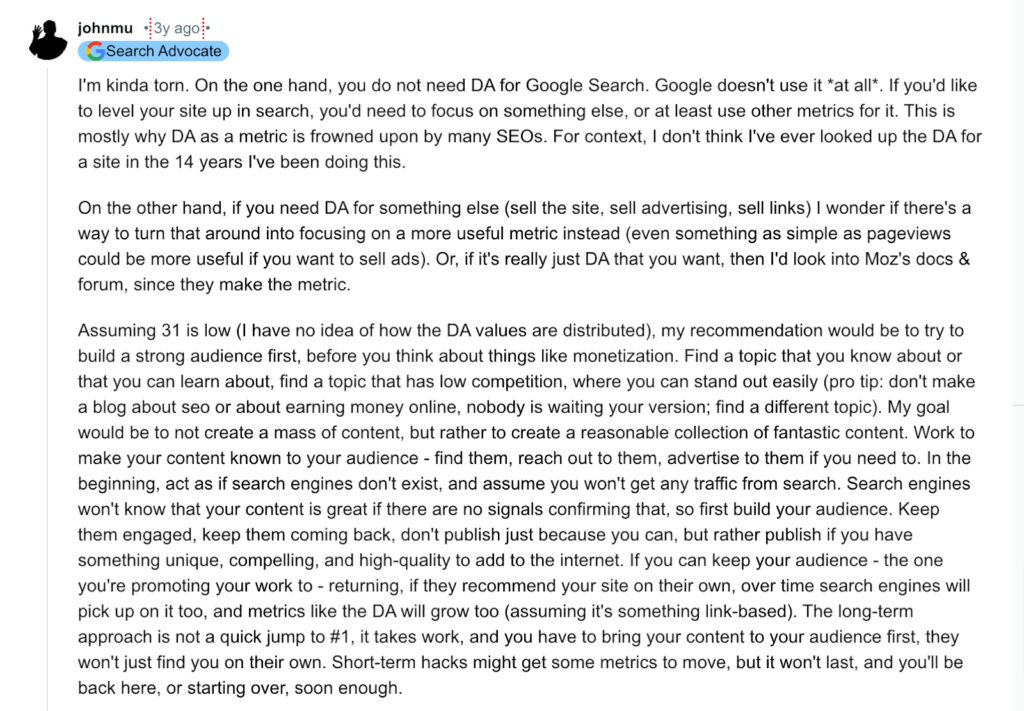
13. Neglecting internal linking structures
Internal linking is done among the pages of your website and is a way of connecting the dots between your content making it easier for Google to figure out what your website is about.
Given how important internal linking is, it’s surprising how often it’s overlooked. Neglecting internal linking and focusing only on backlink building is bad SEO.
Internal linking, when done optimally, spreads the link juice to your internal pages. It’s easy and free to implement and makes for a fundamental part of your link building strategy.
So, always care about building internal links for your website which will help you establish yourself as an authority on a specific niche by showing how your content pieces relate to themselves.
14. Building links too quickly (unnatural link velocity)
According to John Mueller from Google, building a high number of links in a short time is not an issue in itself, it’s the type of links you create during that time.
John Mueller talks about link building in Google Webmaster Central office hours
In many cases, the links you build violate Google’s policies.
For example, using an automated link building program to build links quickly might violate Link spam policies for Google web searches.
Take your time and build your links gradually. Keep the following tips in mind:
- Look for content that is relevant to your website and is of high quality.
- Do not add too many links from a single site as that would look unnatural.
- Use a variety of link building strategies including guest blogging, directory submissions, and social media.
15. Creating links from websites in a different language
If your site is from the US, then Google will expect most of your backlinks to be from the US. Particularly, it would expect most of your links from English language sites.
If it finds that a good amount of links to your site are from different language sites like Japanese or Chinese, in other words, a high percentage of low-quality foreign language links, it might consider the links to be spammy.
16. Spamming links in forums or blog comments
Posting in forums or commenting on blog posts is an age-old SEO strategy. However, it does not carry much weight. Anyone can post in forums or comment on blogs making it an easy and subpar way to get hundreds of links in a very short time.
These backlinks come with the rel=UGC attribute and are treated by Google as nofollow links.
The difference?
User-generated content doesn’t usually carry the same weight as links (even nofollow links) from high-quality sources.
17. Excessive reciprocal linking
How common is reciprocal linking?
Ahrefs made a study exclusively on this to find out that 73.6% of the 140k websites they studied, had reciprocal links.
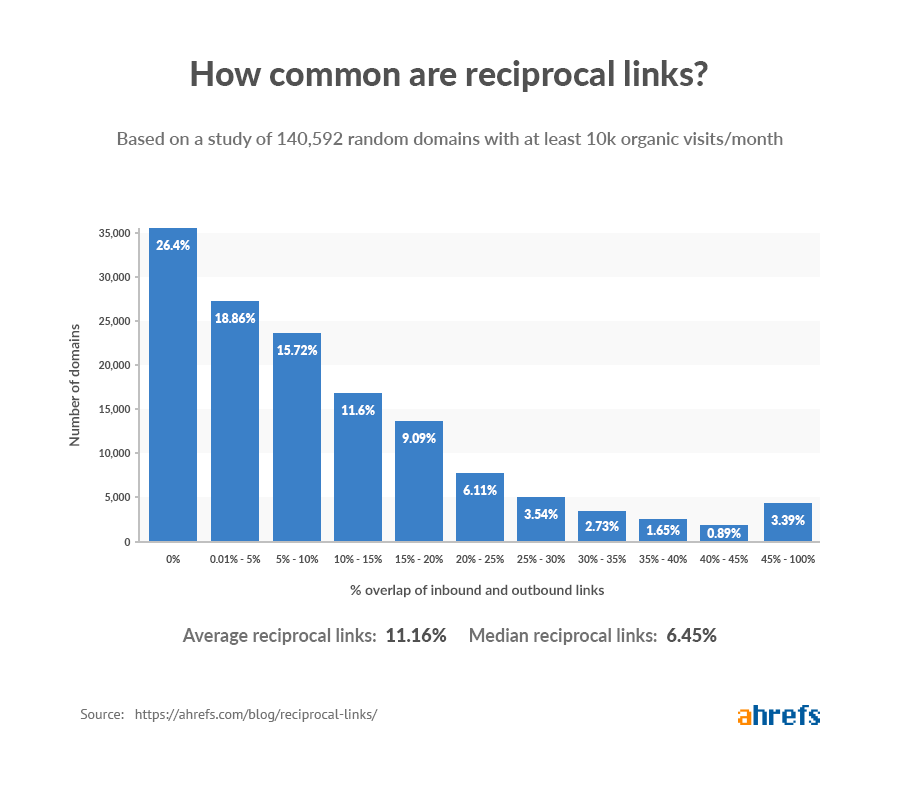
It’s a common practice for websites to refer to one another and have links to the sites among themselves. In fact, there’s nothing wrong with it.
Reciprocal link building is beneficial when done naturally and organically.
The problem begins when the links built become excess. Google might find that you are trying to manipulate the search engine algorithm.
Abusing reciprocal link building looks something like this:
You contact a huge number of websites and ask for link exchanges, particularly on non-relevant or standalone link pages.
18. Not creating link-worthy content
Creating link-worthy content is a great way to boost your SEO. They include content like:
- Stats
- Industry reports
- Research papers
- Infographics
- ebooks
- Downloadable resources
Not only do they provide value to your audience, but they also attract backlinks from other sites.
Developing such content can be challenging. So, connecting with professionals can be the right tactic here.
They can assist you in the right way to create great content that not only ranks great on search engines but also generates valuable links for your site.
19. Not leveraging unlinked brand mentions
If you are an established brand, unlinked brand mentions must be common. If site owners mention you in their content, without linking to your site, then that is an unlinked brand mention.
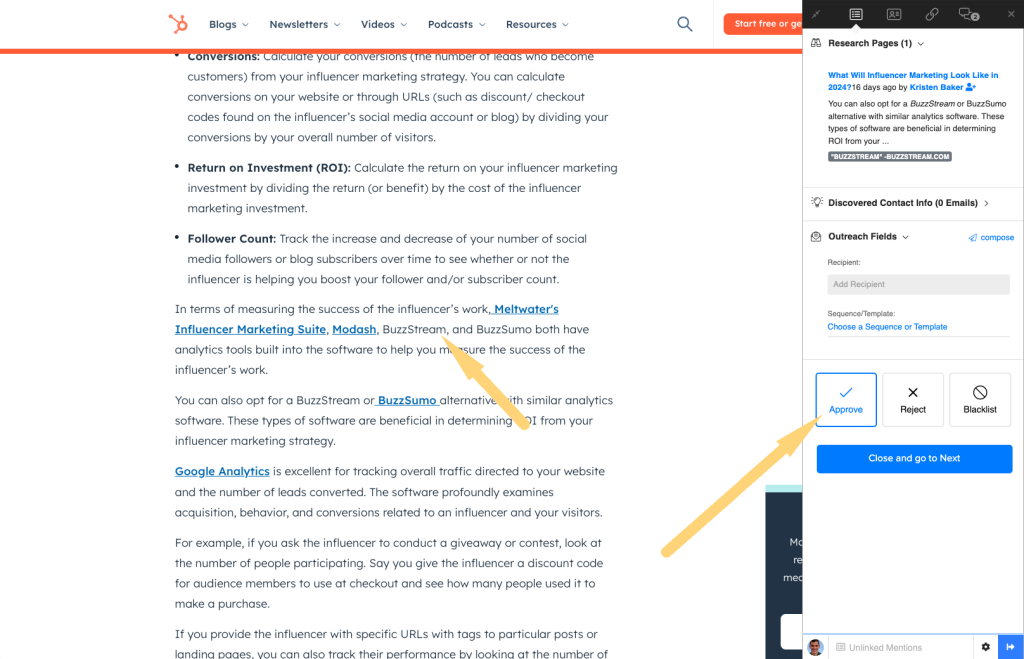
In such cases, all you have to do is ask for the link.
Even if you have to provide them with incentives like offering free credits or inviting them to the affiliate program, it’s relatively easier to get such a link.
It takes little effort on their part to add a link to your website, and as your brand is already there you won’t need to persuade them that you are worth mentioning on their website.
20. Ignoring the importance of social media signals
Ignoring social media signals is not what you want when it comes to link building.
Think of it like this:
When your content gets a lot of attention – likes, shares, comments, etc., it’s not just looking popular or going viral.
Seeing the popularity of your content, it’s likely that a number of journalists, and influencers will want to connect to your site.
Although it’s not obvious that you’ll earn links, and thus many argue the direct importance of social media on rankings. But its indirect importance cannot be ignored.
21. Guest Posting on irrelevant websites
Guest posting is a great and legit way to build links. Choosing relevant and reputable sites to guest post can be beneficial for your link building. However, if you focus too much on quantity and post on irrelevant websites with exact match anchor text, it might attract penalties from Google.
22. Building links to low-quality content
What would you feel when you see a website link on a low-quality, plagiarized piece of content? Not good, right?
You must feel that as with the content, the link too must be of some poor quality website. So, linking to content with poor quality can be a mess, tainting your website’s reputation, and suggesting to search engines and visitors alike that your site may be associated with low-quality sources or even paid links.
23. Using automated link building tools
It’s tempting to try and save time and effort by using automated link building tools. But in the end, it does more harm than good. Here’s why:
They’re spotted as spam: Users and search engines alike mark these links as spam, and when your site has a lot of them, which eventually is the case with automated tools, it’s not just about losing clicks, your entire online reputation takes a hit.
Low-quality links: These links often come from sites that do not do you any favors. Instead of boosting ranks, they might drag you down making it harder for the right people to find you.
24. Building site-wide or footer section links
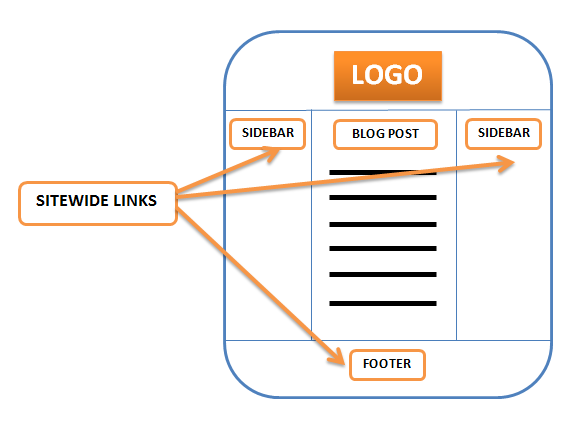
Source: Rankwatch
Building some quick links to site-wide, sidebar, or the footer section was a very common practice till a few years ago. Marketers utilized this practice to give a quick boost to their SEO strategy.
However, with advancements in Google Search engine algorithms, this practice is now better avoided as Google might penalize the site for adopting such means to manipulate the search engine and get a boost.
So, now it’s better to stay away from such practices of building links to sidebars, site-wide, or footer sections. Instead, focus on building links naturally without trying to manipulate the search engine.
25. Using generic or non-personalized outreach emails
Ask yourself. Where do all the generic emails sent to you (probably by some tools) end up? Isn’t it the spam box?
So, if you are using the same tactic and sending generic outreach emails relying exclusively on outreach tools, you may be certain that your emails too are filling up the spam box of the receivers.
Take a look at the example below:
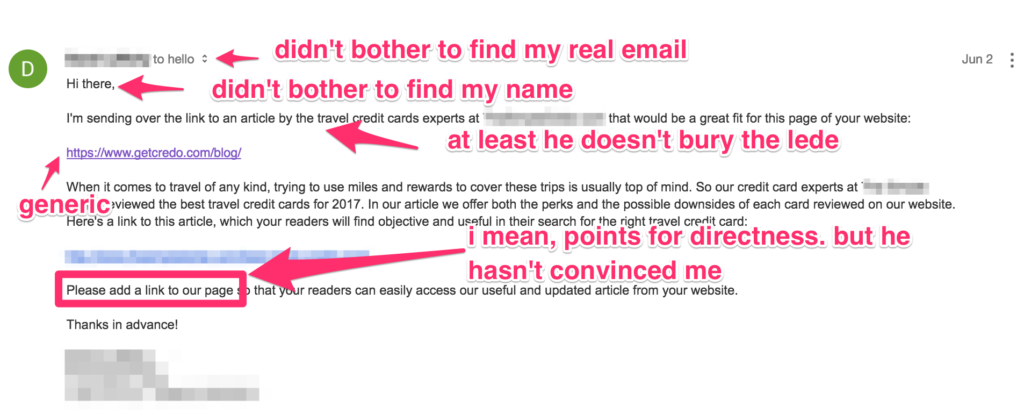
Source: johnfdoherty.com
Now you see how not to write an outreach email!
Apart from being a waste of time, they might harm your domain if you are using your domain email.
Avoid this very costly link building mistake by adopting these practices:
- Have a knowledge of the recipient and their work.
- Refer to their content relevantly
- Get personal by including their name in the subject line and email body.
To increase the chances of response make the email easy to read and get straight to the point.
26. Not measuring link building results
Link building is not just about building a massive number of backlinks and then simply forgetting it. It’s about maintaining the health of your backlink profile.
For that purpose, you need to conduct frequent checks and ensure that your links are active and functioning properly. That way, you’ll avoid the impact of broken links.
As with backlinks, it’s equally important to maintain the health of your internal links. Make sure that none of your internal links are broken, as a broken link can halt the website crawler’s progress and stop it from crawling other pages linking from that page.
You can use tools like Ahrefs to find broken links. Just add the domain address to the Site Audit feature in this tool and you’ll find the broken internal and external links.
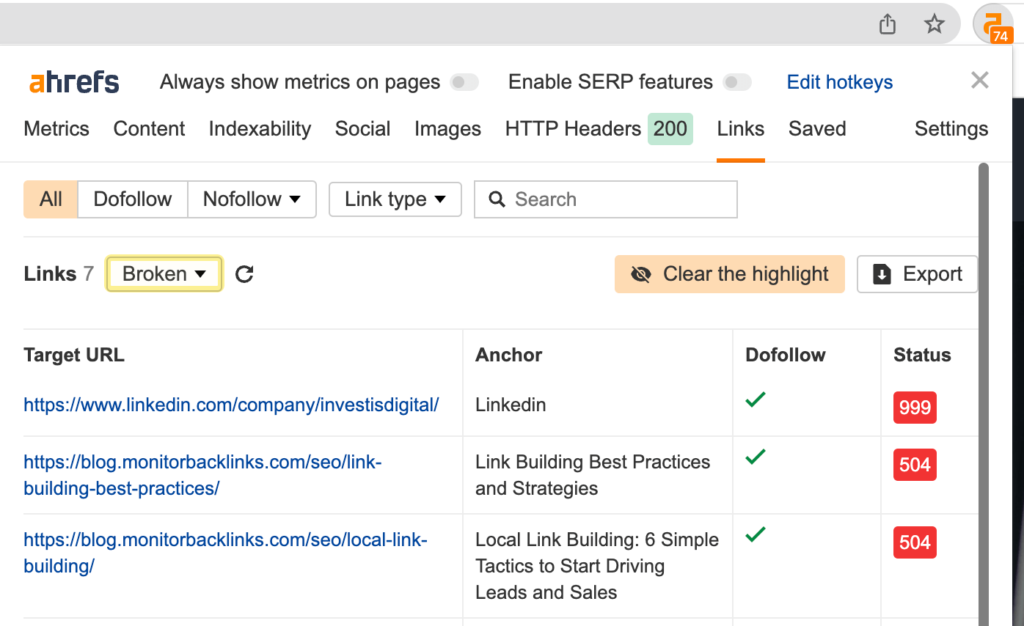
27. Neglecting geo-targeted link building for local SEO
Geo-targeted link building is an SEO strategy focused on acquiring backlinks from websites or domains relevant to a specific geographical location.
This type of link building practice helps businesses improve their local search engine rankings and attract a more location-specific audience.
Do not neglect this link building practice. This is one link building mistake many marketers make that results in missing out on boosting your local SEO.
Geo-targeted link building is a great way to get noticed by customers in your community. These links show Google how relevant you are in your area.
Without listing in local directories and linking to nearby businesses, your website will not rank high on local searches, meaning you’ll miss out on local businesses.
28. Not focusing on links from pages with social shares
To determine the value of a piece of content, Google measures the overall social circle performance of that particular post. With a high reach, such as a number of tweets, likes, or Pinterest shares, a post is bound to perform better than other content pieces.
Building a link with such a source is far more valuable than building links to those pieces that have 0 or very few social shares.
In other words, social shares are a great contributor to SEO and you must focus your efforts on building links to content with high social shares.
29. Article spinning for link creation
This is another very costly mistake that can cost you a lot.
Some marketers spin original articles by replacing words with synonyms and phrases. This is considered a black hat technique and is used by marketers to generate multiple versions of a single article and then use them to get backlinks.
Apart from being unethical, this practice also does not provide any value to the readers. It also results in low-quality content and violates search engine guidelines.
Thus keep away from this practice as it can attract penalties from Google.
If you are using guest posting as a tactic, rely on well-crafted, original content rather than spin.
30. Chasing the “perfect” link instead of consistency
While backlink quality matters, it’s unnatural and unnecessary to run after the ‘perfect’ link.
First, such backlinks are superbly difficult to acquire. It takes time, effort., and luck to get such links.
Also, a backlink profile built of solely such links would look unnatural.
Your competitors are likely to have a natural mix of backlinks and not just perfect links.
To stay in the game stop running after perfect links and focus on building a natural link profile.
Build high-quality backlinks with professionals. Connect with us today!
31. Not leveraging relationships for backlinks
Just think:
Won’t it be easier to earn a backlink from a business if you had reacted to their social media posts? Of course, it would be.
So, take time to build relationships with people from your business niche.
Also, building relationships with businesses in your niche is a great way to build link building opportunities. It can open new doors for you, like guest posts or link exchanges.
This not only gives you quality links but also increases your brand visibility.
32. Ignoring on-page SEO alongside link building efforts
On-page SEO is an essential component of any SEO strategy. It refers to the optimizations we do on the website or a webpage to help it rank.
If not more, it’s as important as building backlinks.
Think of it:
You go on building links to your page without optimizing it for the visitors or search engines. What do you think would happen? When someone clicks on the backlink they will be directed to a site that appears poor or out of place.
The only thing that would happen is the perceived authority and value of your site would fall along with the rankings.
So, do not ignore on-page SEO as it holds the key to a successful site.
33. Building links in a negative or controversial context
It’s a common industry belief that search engines can and do go through what’s being said in and around your link.
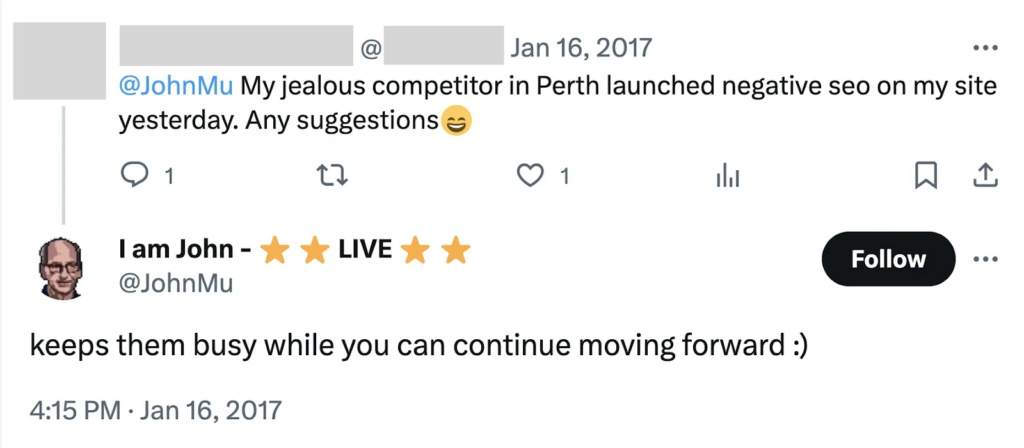
Source: Semrush
Thus, if trustworthy sites are linking to your site in a negative or controversial context, you can expect some backlash from the search engines.
Though the exact implications of this are unknown, it’s reasonable to expect the negative and should be avoided at all costs.
Conclusion
Discussed above are the common link building mistakes that many make while trying to build backlinks.
Learn to avoid these common pitfalls of link building which will help you build a healthier backlink profile for your site while avoiding penalties commonly associated with poor link building practices.
Go through the list and check if you have made any. Or, if you are freshly building links for some websites, this updated list will provide you with insights about what not to do in link building.
If, however, you find it confusing or want your link building activities handled by professionals, you can contact us for a super fine SEO experience and results.
FAQs
What is link building, and why is it important for SEO?
Link building refers to the process of acquiring hyperlinks from a website pointing towards yours. These links act as ‘votes of confidence,’ telling the search engines that your site content is valuable and credible.
Are all backlinks beneficial for SEO
No, all backlinks are not good for SEO. Low-quality backlinks from irrelevant, spammy, or penalized sites can harm your SEO efforts.
How can I build links without violating Google’s guidelines?
To build links without violating Google’s guidelines:
1. Create high-quality sharable content
2. Guest post on reputable sites
3. Avoid paid or manipulating linking schemes
